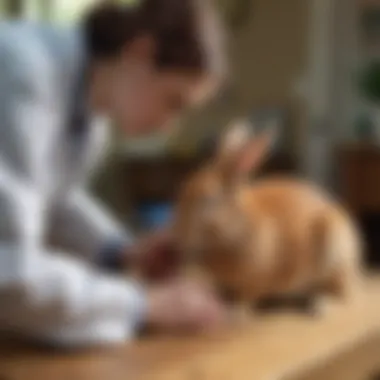Understanding the Costs of Bunny Ownership: A Complete Guide


Intro
Owning a bunny can be a rewarding experience, but it is crucial to understand the costs involved. Many potential owners tend to overlook some of the significant expenses related to this responsibility. This article provides a comprehensive review of the financial aspects of owning a bunny. It’s not just about the initial purchase; factors like grooming, food, and health care also play important roles. A well-informed decision minimizes risks and ensures the well-being of the new pet.
Initial Costs
When considering a pet rabbit, the first expense normally comes from acquiring the animal itself. Adoption fees from rescue shelters can range from $50 to $200. If you decide to buy from a breeder, costs may escalate to $300 or more, depending on the breed. Besides the cost of the bunny, additional initial expenses arise.
Buying cages, bedding materials, and toys happens early in the squirrel’s life. A suitable habitat can cost from $100 to $250. Bedding materials would generally call for an additional $20, and toys can range from $10 to $50. These are essential for the bunny’s comfort and well-being.
Regular supplies should not be ignored either. Litter, hay, and fresh vegetables should also feature in your budgeting calculations. On average, expect to allocate another $30 to $50 per month for such provisions, depending on your bunny's needs.
Ongoing Costs
Ongoing costs dominate the financial outflow of bunnies. Regular expenses contribute significantly to overall ownership costs. These include food, litter, and veterinary services. Proper nutrition is paramount for bunnies, requiring high-quality rabbit pellets along with hay and fresh veggies. This typically accounts for around $35 to $100 per month.
Veterinary care is another crucial sphere. Routine check-ups may range from $50 to $200 annually, highly dependent on your location. Vaccinations, spaying, or neutering can add an additional one-time cost of $300 to $500 if you haven’t already completed these procedures.
Hidden Expenses
It is important to remain vigilant about hidden costs. Bunnies, like all pets, have unpredictable medical expenses. Unexpected illnesses can lead to costs skyrocketing for treatments, sometimes in the thousands. Also consider supplies like additional beds, replacement toys, and unexpected visits to the vet, which may frequent your expenses as your bunny grows older.
Finally, financial planning should consider long-term obligations related to your lifestyle changes. Have you budgeted for vacations or other changes that might impact your ability to care for your bunny? Situations may arise that could prompt you to seek alternatives for your pet’s care.
Epilogue
In summation, before embracing bunnies as companions, knowing the investment needed is invaluable. This guide outlines how prospective owners can better appreciate the significant fluctuations in costs.. Keeping a bunny involves thoughtful financial planning and long-term commitment. For individuals ready for this responsibility, their loveably playful presence can bring immense joy to life.
Preface to Bunny Ownership
Owning a bunny can be a rewarding experience, but it entails more than just a fleeting amusement. It requires careful consideration of various factors that contribute to the overall well-being of the bunny and the owner's responsibilities. This section aims to elucidate the fundamental aspects of bunny ownership, focusing on commitment and emotional connections.
Understanding the Commitment
Being responsible for a bunny means embracing a long-term relationship. Bunnies typically live five to ten years, sometimes even longer. Potential owners must be aware of the responsibilities that come with this dedication. It involves daily needs such as feeding, grooming, and social interaction. In addition, a person should consider their lifestyle. Changes like moving, job responsibilities, or family growth can significantly impact a bunny's environment and care.
The commitment also extends to understanding the complexities of their health needs. Bunnies are delicate creatures prone to specific health issues. Therefore, regular veterinary check-ups become indispensable. This commitment is not only financial but also emotional. Owners need to often attentively observe the bunny's behavior for any sign of distress. Thus, the enhancement of the human-animal bond forms a crucial part of this journey.
The Love for Bunnies
Many people feel deeply connected to bunnies. This emotional aspect of bunny ownership cannot be understated. Bunnies display unique personalities. Each one has its dynamics and preferences. This fact enhances the joyfulness of ownership following the initial adaptation phase. They can reciprocate love and affection toward their owners when proper care is provided.
Such a loving relationship fosters a sense of companionship that can improve quality of life. Having a bunny also aids in the development of a routine. Engaging in activities like playtime or grooming can provide mutual emotional benefits – for both the bunny and the owner. Taking these steps increases knowledge about bunnies, leading to better care and understanding.
Owning a bunny is not merely having a pet; it is a commitment to nurturing a living creature.
Feeling the pulse of another being under one's care develops a heightened awareness of emotions. As owners forge their bond with bunnies, they inadvertently learn essential virtues such as patience and responsibility. Thus, the love for bunnies transcends mere affection; it becomes a conduit for personal growth.
Initial Costs of Acquiring a Bunny
Understanding the initial costs involved in acquiring a bunny is essential for prospective owners. This fase sets the foundation for responsible bunny ownership and sheds light on both immediate financial commitments and long-term considerations. Having a clear view of these costs can reflect a pet owner’s preparedness to provide a significanly suitable environment for their new furry friend. Furthermore, it identifies essential supplies and housing necessities that will ensure the bunny’s comfort and well-being from day one.


Purchase Price or Adoption Fees
The purchase price and adoption fees can vary greatly based on the source. When buying from a breeder, rabbits might cost anywhere from $50 to several hundred dollars. This variation is influenced by breed, lineage, and location. However, adopting from a rescue or shelter generally involves a lower cost and often includes spaying/neutering, vaccinations, and initial health checks. Adoption fees typically range from $25 to $100.
Both choices have advantages: purchasing from a breeder allows for select breed features. On the other hand, adopting provides a home to a needy animal. Consideration of personal priorities and circumstances should guide this decision.
Essential Supplies
Taking care of a bunny goes beyond initial expenses of purchase or adoption. Essential supplies must be factored in to create a loving environment where the animal can thrive. Below are two crucial categories: food and water bowls, bedding and litter.
Food and Water Bowls
Food and water bowls are critical. Quality materials, like ceramic for the bowls, reduce the risk of tip-over during feeding. This stability is a timeless choice trusted by many accidents fell, unlike thinner plastic options which quickly break. Regular cleaning contributes to the overall health of the bunny by keeping their eating area sanitary. Investing in durable dishes leads to lasting benefits with minimal disruption.
Bedding and Litter
Bedding and litter also matter significantly. Using absorbent materials such as paper, hay, or wood shavings as bedding ensures comfort and helps control odors. A popular choice is recycled paper pellets due to being eco-friendly and effective in managing moisture. However, some may have concerns with dust; proper selection and maintenance can alleviate such aspects. Good choice not only promotes comfort but also aligns with sensible budgeting, reducing supply needs in long-range planning.
Housing Considerations
Housing decisions directly influence both immediate comfort and long-term stability. Choosing between hutches and indoor cages has distinct pros and cons.
Hutches vs.
Indoor Cages
Hutches, often utilized for outdoor environments, offer bunnies exposure to untamed spaces but need regular cleaning and upkeep. On the contrary, indoor cages provide a secured habitat and can more easily integrate into daily life.
Effective selection requires balancing available space, climate considerations, and the rabbit’s needs for a safe outdoor experience. Each option has unique advantages and it is essential to fit whichever selected route into the desired living arrangements.
Pen or Play Area Setup
Setting up a pen or play area demands careful layout planning to ensure sufficient roaming room, thus optimizing the bunny’s comfort. Adequate exercise spaces help maintain good health and behavior by supporting natural instincts for exploration. Clear boundaries through specialized pen setups minimize damages around your home. Investing in such systems promotes benefits exceeding physical enclosure by fostering mental stimulation, yielding happy bunnies. Consider these setup tasks diligently to harmonize with overall housing arrangements outlined beforehand.
A solid understanding of initial costs helps avoid unexpected stresses in new pet commitments. It emphasizes integration into your lifestyle, underlining the significance of responsible ownership practices.
Ongoing Care Costs
Understanding the financial aspects of ongoing care for your bunny is crucial for ensuring long-term happiness and health. Many first-time bunny owners overlook these continual costs, which can fluctuate with your bunny's age and health needs. Dollars spent now will contribute to their quality of life and prevent higher expenses later from complications due to neglect. Thus, being informed about ongoing care costs is not only sensible but essential.
Food Expenses
Types of Bunny Food
When we talk about bunny food, it mainly revolves around hay, pellets, and greens. Hay is primarily a bunny's diet, rich in fiber which is crucial for their digestive health. Generally, timothy hay is well-regarded by bunny enthusiasts due to its high-quality nutrients. The incorporation of various pellet brands adds consistency to a bunny's diet,. These pellets are crafted specifically for bunnies, comprising vitamins and minerals without any fillers. Properly selecting types of bunny food is vital as it supports ideal health, maneuvers away from obesity, and impedes dental problems.
Fresh Produce Costs
Including fresh veggies contributes to their balanced diet. Fruits and vegetables like romaine lettuce, parsley, or carrots solicit significant joy for bunnies and provide essential nutrients. Adding these into their diet can elevate happiness and overall health. While buying fresh produce adds breezy variation to their meals, one must exercise caution to offer them in moderation, as overconsumption can lead to potential gastrointestinal disturbances. Remaining informative about costs for high-quality fresh fruits and vegetables ultimately upholds the dietary well-being of your bunny.
Routine Veterinary Care
Annual Check-Ups


Regular veterinary exams define preventative care for bunnies. Annual check-ups function as cornerstones for detecting health issues before they escalate. During these visits, a vet verifies weight, diet, and overall health through simple assessments. The key benefit lies in avoiding emergencies later on, preserving their life quality and reducing potential future costs arising from untreated ailments. Keeping on schedule for precise yearly evaluations acts both as an investment in baking wholesome longevity and a sensible practice for conscientious bunny ownership.
Vaccinations and Spaying/Neutering
Vaccinations fill significant roles in preventing several diseases. Considerations must extend to spaying or neutering health matters. Procedures like these elucidate a dual purpose—they cut down unexpected health risks and greatly help manage behavior issues related to mating instincts. It may seem like a hefty price upon the initial setup; however, benefitting much more diminishes the unforeseen complications later on. To protect your bunny's health and ensure emotional stability, proper vaccinations and surgeries are prudent investments.
Grooming Needs
Brushes and Tools
Grooming centralizes more than merely appearance; it's paramount for health reasons. Special tools, like de-shedding brushes and combs, are tailored to each breed for maintaining healthy coats while avoiding severe stress and anxiety. Regular brushing decreases the likelihood of knots and removes loose fur—a known catalyst to hairballs. While some may see it as trivial expenditure, the choice of good brushes extends adherence for softer, comfortable treatment.
Professional Grooming Costs
Professional grooming can act as an auxiliary service depending on your bunny's situation. Factors, such as show readiness for pet positioning or routine care difficulties, necessitate help. Although costs may vary broadly based on your location and services, understanding how often to employ these professionals aligns budget comfortably with requirements for care needs. Using professional help sometimes elevates the joyfulness or health of your bunny towards optimized living.
In summary, integrating knowledge regarding ongoing costs aids bunny owners. Remaining informed provides options in preventive care, financial planning, and fulfillment level ratification.
Hidden Expenses of Bunny Ownership
Understanding the hidden expenses of bunny ownership is crucial for any prospective owner. Bunnies are lively creatures that require consistent care and attention. However, many first-time owners often overlook certain costs associated with their well-being. Acknowledging these hidden expenses helps ensure that your pet is not only comfortable but also healthy and happy.
Emergency Vet Visits
Veterinary care can emerge as an unpredicted but vital expense for bunny owners. Bunnies can experience unexpected medical issues that require immediate attention. Conditions such as gastrointestinal stasis or respiratory problems are not uncommon. An emergency vet visit can cost significantly more than a typical check-up.
Bunny owners should set aside funds specifically for unexpected medical situations. On average, emergency visits may range between $75 to $150, depending on the location and specific issue. This amount can increase for advanced treatments or hospitalization.
It's sensible to research nearby animal hospitals that accept rabbits and check if they offer payment plans or pet insurance options. Being prepared for emergencies means that you can gain peace of mind while ensuring your bunny receives the necessary care.
Financial Planning for Bunny Ownership
Financial planning is essential for responsible bunny ownership. Understanding the costs involved helps foster a lasting and positive relationship with the pet. Bunnies require both financial and time investment from their owners.
Careful attention to financial planning supports well-being of the bunny. By assessing initial costs and long-term commitments, owners can avoid unexpected financial stress. Moreover, recognizing all necessary expenditures enables detailed and actionable budgeting, ensuring the owner's ability to meet the needs of their bunny.
Budgeting for Initial Costs
Habits of budgeting play a vital role when approaching bunny ownership. Initial costs often set the stage for overall financial success. An average purchase price can differ by breed. If choosing to adopt from shelters or rescue groups, this may also impact finances.
Essential supplies are another initial cost to consider. Items such as food and water bowls, bedding, and litter are primary needs. Purchasing appropriate housing is crucial. Whether one opts for a hutches, an indoor cage or a play area setup, costs can vary significantly.
A well-prepared new owner may create an itemized spending plan. Consider listing each necessary supply with associated costs. Here is a rough outline for budgeting initial costs:
- Purchase price or adoption fee
- Food and water bowls
- Bedding and litter
- Housing (rabbit hutches or cages)
- Initial vet checkup
Mintening a initial budget can better equip future owners with a comprehensive view of the financial requirements.
Creating a Monthly Expense Plan
After establishing initial costs, forming a monthly expense plan is crucial. Continued care for a bunny demands predictable outlays. Owners should account for food, routine vet visits, and general supplies required each month.


Influential factors such as dietary preferences need consideration. Bunnies thrive on a balanced diet consisting of hay, pellets, and vegetables. Making a monthly grocery list can aid in maintaining this balance. Also, plan for frequent purchases of fresh vegetables and replacement items.
Veterinary care introduces recurring costs. Regular check-ups and vaccinations should be factored into the monthly plan. Grooming needs can also incur expenses. Basic tools like brushes, as well as occasional professional grooming, must be included.
In crafting a monthly expense plan, consider utilizing a simple spreadsheet or budget management app. Here are a few common monthly expense categories:
- Food: hay, pellets, vegetables
- Veterinary care: check-ups, vaccinations
- Supplies: bedding, litter
- Grooming: brushes and tools
Ending on Financial Planning
Assembling an effective financial plan ensures readiness for the obligations of bunny ownership. Budgeting allows an owner to balance quality care with financial responsibility. Transitioning into pet ownership demands mindfulness. Financial planning emerges not only an economic necessity, but also a commitment to a pet's quality of life.
Long-Term Commitment to Bunny Care
Owning a bunny is not just a short-term joy; it involves a long-term commitment that demands attention, care, and resources. Understanding this commitment is crucial for anyone considering adding a bunny to their household. From the initial excitement of bringing a furry friend home to the more subtle, ongoing responsibilities, prospective owners must grasp what it truly means to care for a bunny over many years.
Lifespan Consideration
Bunnies typically live between seven to ten years, some reaching even longer with proper care. This lifespan suggests that bringing them into your life should be a thoughtful decision. Many first-time owners might not realize that, like any other dog or cat, bunnies require consistent attention throughout their entire lives. Any sudden shifts in life circumstances—be it job changes, moving homes, or starting a family—must also be considered. Will you still have the capacity to prioritize your bunny’s needs?
A welcoming home alone does not suffice for ensuring a bunny's happiness—compromising their well-being could have lasting impacts on both the animal and owner’s mental state.
Financial Responsibility
The cost of maintaining a bunny includes food, veterinary visits, and supplies. Budget always anticipates additional resources for emergencies or unexpected circumstances that may occur within those years. Without careful planning, these costs can quickly add up, creating a financial burden that might strain the owner’s capacity to ensure adequate care.
Another critical aspect of ownership is routine vet visits to adhere to the animal's health needs as ages. Illness or health emergencies can arise at any time, making prioritizing veterinary care crucial.
Understanding Lifespan and Care Needs
In-depth knowledge about your bunny’s lifespan and the specific care they need is imperative. Recognizing breeds and individual requirements allows focusing on suitable diets or appropriate accommodations to promote quality living for your bunny. Different breeds may have unique needs, necessitating specific food types, housing considerations, or health supplements that go beyond the traditional rabbit care guide.
- Dietary Needs: Proper nutrition plays a significant role in ensuring a robust track of life expectancy. A balanced diet comprising high-fiber pellets, hay, fresh vegetables, and occasional treats can help mitigate health issues. Owners must familiarize themselves with the variations of preferable bunnies’s foods.
- Social Interaction: Bunnies are exceptionally social animals, thriving on interaction and companionship. The lack of bonding time can lead to detrimental behavioral shortcomings. Understanding the need for playtime and human interaction and generally nurturing that emotional aspect leads to a happier bunny overall.
- Living Environment: Sufficient space for exercise and exploration is paramount. Many sorts of environments must be conducive to your bunny’s exploration and enrichment—closed cages can cause lasting behavior issues. Focused expansion of locations fosters familiarity and lessens stress.
Preparing for Change in Needs
Owners must prepare for how a bunny�’s needs and behaviors change as they age. Here's how:
Anticipating Growth or Decline: Awareness of behavioral development and physiological changes must also be taken into careful consideration, particularly regarding different stages of life.
- Adolescent Changes: Young bunnies may require more intense socialization and behavioral guidance compared to older partner—owners must step up security of essentials like materials and play areas to enhance learning.
- Senior Rabbit Considerations: As bunnies age, they may become more susceptible to health issues. Adapting diet to accommodate dietary restrictions and increased vet care instances are likely activities. Flatter areas to help comfort arthritic limbs or adjusted litter box access as capabilities decrease enhances easing time in their senior years.
By maintaining foresight and flexibility, owners cultivate patience and quality over the life course of their orphan or bonded pet. The journey of being a responsible bunny parent incorporates both understanding post nuances experienced over time and preparing for comfort through love and heal ideally.
In summary, dedication is about validation rather than symptoms. A continual commitment translates into vast personal fulfillment and sustained prevention of unwanted surprises. Coordinates simple with different preparations affirm viable alternatives endeavor managing costs associated with skill shifts relating confidently embracing pet strengths.
Epilogue
Owning a bunny is a multifaceted experience, one that involves significant financial considerations. The conclusion summarises the critical aspects outlined in this article, aiming to reinforce the responsibilities associated with bunny ownership. It is crucial to appreciate the cumulative costs over the lifespan of a bunny, which generally extends a decade or longer. Potential owners must be aware of not just the initial acquisition expenses, but also the ongoing care needs that can strengthen over time.
Making Informed Decisions
The decision to adopt a bunny should not be taken lightly. By understanding the comprehensive costs involved, potential owners equip themselves with knowledge that goes far beyond emotions or instincts. Advanced research is vital, exploring reputable sources about bunny behaviours, care, and needs ensures that choices are made on rational grounds rather than impulse. Calculating an accurate long-term budget can help in identifying if one's financial situation permits such an obligation.
Moreover, assessing the commitment to dedicate the necessary time and effort to their wellbeing is just as essential as calculated expenses. Understanding food requirements, housing setups, and potential veterinary costs fosters more profound insights and red flags. This careful evaluation equips owners not just to provide a home, but a thriving environment for their bunnies.
The Benefits of Bunny Ownership
Bunny ownership provides significant rewards alongside the responsibilities. The companionship a bunny provides is unique. These animals develop bonds with their owners that demonstrate affection and loyalty. Moreover, they often have playful backgrounds, thus bringing joy to family homes. While the initial and ongoing costs can appear considerable, the fulfillment they offer can outweigh these financial commitments.
In addition, bunnies encourage owners to adopt responsible habits when it comes to practices like budgeting. They also require structured routines that involve feeding and veterinary visits, which can offer a pleasurable rhythm to daily life. There are also educational aspects; they may introduce families to basic concepts of animal care. This understanding is invaluable when considering responsibility, care needs, and financial awareness. Finally, through owning a bunny, individuals cultivate a deeper appreciation for these beings, resulting in a more empathetic outlook toward animal welfare in general.
Investing in a bunny cannot solely be viewed in monetary terms; the enriching experiences and lessons learned from caring for one often return immeasurable value. Ultimately, while financial planning is crucial, the intangible benefits play an equally essential role in the decision-making process.



